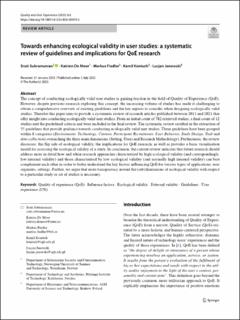| dc.description.abstract | The concept of conducting ecologically valid user studies is gaining traction in the field of Quality of Experience (QoE). However, despite previous research exploring this concept, the increasing volume of studies has made it challenging to obtain a comprehensive overview of existing guidelines and the key aspects to consider when designing ecologically valid studies. Therefor this paper aims to provide a systematic review of research articles published between 2011 and 2021 that offer insight into conducting ecologically valid user studies. From an initial count of 782 retrieved studies, a final count of 12 studies met the predefined criteria and were included in the final review. The systematic review resulted in the extraction of 55 guidelines that provide guidance towards conducting ecologically valid user studies. These guidelines have been grouped within 8 categories (Environment, Technology, Content, Participant Recruitment, User Behavior, Study Design, Task and data collection) overarching the three main dimensions (Setting, Users and Research Methodology). Furthermore, the review discusses: the flip side of ecological validity, the implications for QoE research, as well as provides a basic visualisation model for assessing the ecological validity of a study. In conclusion, the current review indicates that future research should address more in detail how and when research approaches characterized by high ecological validity (and correspondingly, low internal validity) and those characterized by low ecological validity (and normally high internal validity) can best complement each other in order to better understand the key factors influencing QoE for various types of applications, user segments, settings. Further, we argue that more transparency around the (sub)dimensions of ecological validity with respect to a particular study or set of studies is necessary. | en_US |

